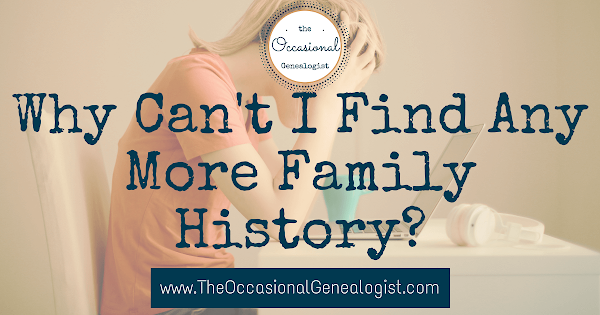If you're asking why you can't find more information on your family history, or even wondering if a professional can find more, consider first using this technique critical to all professional genealogists.
I wrote the original version of this post for my professional services blog way back before I created The Occasional Genealogist. That means you'll see it refer to "hiring a professional," or "your professional," etc. This concept applies whether you hire someone or are doing your own genealogy research. If you're DIYing your family tree, simply think of yourself as the professional (seriously, try this, it can change how you approach your research and break you out of a rut).

A research plan helps you determine where you're going, but it starts with knowing where you've been. Attaching records and information to a family tree does not tell you where you've been. Let's consider this with an analogy you are hopefully familiar with.
Genealogy is very much a journey. When we're thinking about how to know where we've been, we can compare it to an actual trip.
Your family tree or even genealogy forms or software (any tool where you put information into boxes or fields asking for a name, date, place, or other short pieces of information) is like going back over your photographs to see where you've been.
What you need to look at is more like a video of the entire trip (taken without turning the camera off) or looking at a digital map that tracked your exact route, complete with photographs of each turn and stop you made (not just the photos you thought to take, more than that!).
Depending on what kind of photographer you are, you might realize there's a huge difference in these two options or not.
Your family tree only gives snapshots of where you've been. You get stuck because you took pictures of what caught your attention, what you knew to attach to your tree. What you need now are the things you didn't notice and naturally forgot about.
If you're hiring a professional genealogist, you should start with collecting information (names, dates, and places) AND the sources you've used. If you don't provide sources along with the information, it is guaranteed your professional will repeat some of the work you've already done.
Since you pay for the genealogist's time, you're wasting money. If you're doing the research yourself, you're wasting your time, which I know is a limited quantity.
Even if your research consists only of talking to relatives or looking through keepsakes from the family, you need to record what information came from these sources. You need to record exactly what information came from each item.
Don't roll it all together:
"I got grandpa's birth information from his military papers and what mom told me and the census also gave me that information" <--This isn't clear. I know from experience you didn't get his full birth year from the census but if you mentioned a source I wasn't familiar with, I would have no idea what information came from which source. And what kind of military papers are we talking about. What did mom tell you? Did she know grandpa to be familiar with his birth date and place?
If there was a problem, your professional couldn't untangle this statement. They would need to start over to sort out what information came from which source. Are all those sources, and the information they provided, still available so this can happen?
[Related: part of the issue here is not all sources are created equal. Some are just wrong whereas others have a mistake or just repeat information. This post will help you learn more about this additional genealogy skill.]
There is already an easy way to make sure you document where you've been on your genealogy journey, and do it in a way that will help your future, more experienced self. Sadly, online research has practically obliterated this skill. The skill is note-taking and it's actually easier than you think and absolutely crucial to genealogy success.
Note-taking might sound like a boring school subject you'd like to forget but in genealogy, it's actually far more exciting.
Note-taking is actually more like deciphering a secret code. Taking the notes is creating the message you'll need to decode. Yes, it's the least fun part of the process but without it, you've got a bunch of snapshots and nothing to connect them (and if you want a spy analogy, snapshots missing their microdots).
You can read this post to learn why genealogy notes are so crucial to research.
By taking genealogy notes, one note for each source you use, you create a "paper-trail" when you get stuck and need to identify why. Digital notes can even stand in for also keeping a "research log" (if you take paper notes you still need a research log or research calendar).
So if you're wondering why you're stuck after starting your family history, it's because you don't know where you've been. Taking notes, including recording the source, will give you a better picture of where you've been. The sources will help you identify problems in the information you've saved. Notes will provide clues. Both of those are crucial to getting your family tree growing again.
Related posts:









